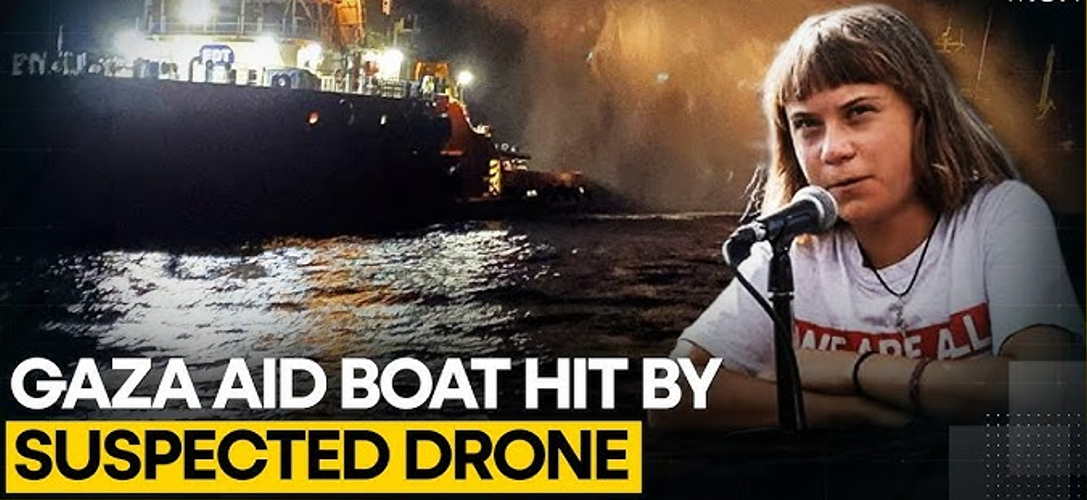The Portuguese-flagged Global Sumud Flotilla ship carrying Greta Thunberg and civilians from 44 nations to Gaza was damaged in a suspected attack, though Tunisian authorities dispute a drone strike.
In a highly charged and controversial development, the Global Sumud Flotilla (GSF), a coalition of humanitarian aid vessels carrying pro-Palestinian activists including Swedish environmental and human rights activist Greta Thunberg, reported that their lead vessel was struck by a suspected drone attack while anchored near the port of Sidi Bou Said in Tunisia. This alleged drone strike, which caused a fire and damage to the boat’s main deck and storage compartments, has stirred international attention, but has also been met with strong denials and investigations underway by Tunisian authorities, adding to the complex geopolitical tensions surrounding the Gaza conflict.
The flotilla, consisting of approximately 20 boats with activists from over 44 countries, set sail from Barcelona on August 31, 2025, with the mission to break the Israeli naval blockade on Gaza and deliver vital humanitarian aid including food, water, and medical supplies. After navigating through stormy weather that delayed their departure twice, the flotilla reached Tunisian waters over the weekend and was anchored roughly 80 kilometers from Sidi Bou Said when the incident occurred.
According to statements from the flotilla’s organizers, the Portuguese-flagged lead vessel, called the “Family Boat,” was struck by what they described as an incendiary drone, which caused an explosion and subsequent fire onboard. Footage shared by the GSF on social media appeared to show a bright aerial object descending rapidly onto the deck, followed by a fire outbreak. Witness Miguel Duarte, aboard the ship at the time of the incident, stated in an interview that he saw a drone hovering about four meters above the deck before it dropped an explosive device, resulting in a significant blaze that could have endangered the lives of those onboard.
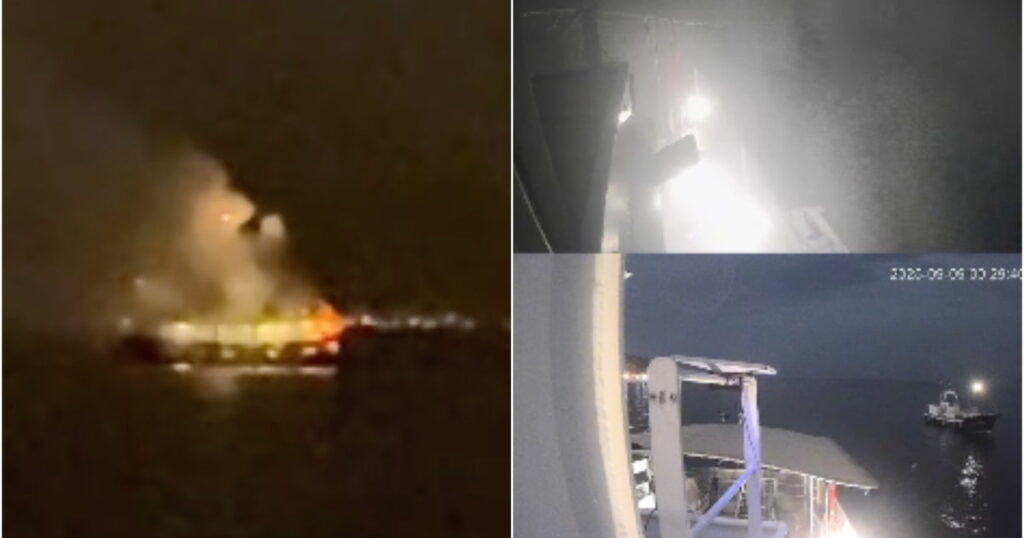
Despite the fire and damage, fortunately, all six crew and passengers, including Greta Thunberg, were reported safe. The crew was able to extinguish the flames after the explosion. This incident follows a tense mission atmosphere, as the flotilla members anticipate potential interception by the Israeli navy before reaching Gaza.
In stark contrast to the flotilla’s statement, Tunisian officials and security forces have categorically denied that the incident involved a drone attack. A spokesperson from Tunisia’s National Guard stated that no drone was detected in the area. Authorities suspect that the fire resulted from an internal accident, likely caused by a lighter or a cigarette igniting a life jacket onboard the vessel. The Tunisian Interior Ministry emphasized that specialized security units are conducting a thorough investigation into the origins of the fire.
The discrepancy between the flotilla’s claim and the Tunisian government’s position has raised wide questions over the true nature of the event, and both sides have pledged to reveal investigation results once available. Tunisian officials have underscored the importance of national sovereignty, warning that any confirmed hostile act—such as a drone strike—would represent a serious violation and potential aggression against Tunisia itself.
Francesca Albanese, the United Nations Human Rights Council’s special rapporteur on Palestinian territories and a participant aboard the flotilla, commented that while the facts must be clarified, an attack on the flotilla in Tunisian waters would represent a grave insult to Tunisia’s sovereignty and a dangerous escalation in the regional conflict. Albanese has been notably critical of Israel’s military operations in Gaza and has faced sanctions from the US government, which Israel’s Prime Minister Benjamin Netanyahu publicly supported.
The controversial incident occurs against the backdrop of a long-standing Israeli naval blockade on Gaza, instituted in 2007 after Hamas took control of the territory. Israel claims the blockade is necessary to prevent weapons smuggling to Hamas but has faced significant international criticism for the humanitarian consequences.
Since the blockades’ imposition, several flotillas have attempted to break through via international waters to deliver aid. One of the most infamous was the 2010 Mavi Marmara flotilla, where Israeli commandos stormed the ship, resulting in the deaths of 10 Turkish activists and injuries to many others. This event dramatically heightened international scrutiny of Israeli policies towards Gaza.
In 2025 alone, multiple attempts to breach the blockade have been reported. Earlier this year, the Freedom Flotilla Coalition (FFC) aborted their mission after claiming their ship was targeted by drones near Malta. The Madleen and Handala flotillas, other aid missions in 2025, were intercepted by Israeli forces, with activists detained and deported. Greta Thunberg herself was detained by Israeli forces during a similar effort in June 2025 when the activists were held at Ashdod port and later deported. Israel has characterized these flotilla attempts as mere publicity stunts rather than genuine humanitarian efforts.
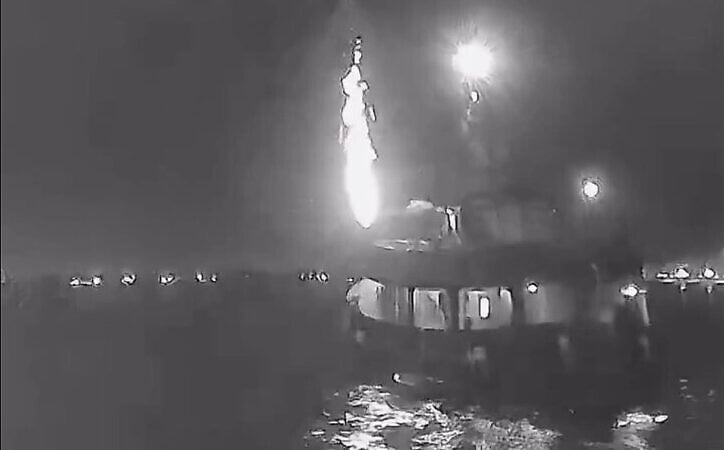
The flotilla mission shines light on the worsening humanitarian crisis in Gaza, which has been exacerbated by repeated conflicts and the prolonged blockade. In late August 2025, a UN-backed organization officially confirmed the existence of famine conditions in Gaza, directly attributed to what it called Israel’s “systematic obstruction” of aid entry into the territory.
Since Hamas’s surprise invasion of southern Israel on October 7, 2023, triggering a large-scale Israeli military offensive, the civilian population in Gaza has suffered devastating losses. According to reports by Gaza’s Hamas-run health ministry, over 64,000 people have died in Israeli military attacks. Israel has enforced near-total blockades on essential supplies for months, permitting only limited aid after international pressure, and has sought to control aid distribution through the Gaza Humanitarian Foundation—an entity criticized by many aid agencies for lack of transparency.
The drone strike allegations, whether confirmed or not, underline the dangerous environment surrounding humanitarian efforts in the region. The flotilla members, including Thunberg, are well aware of the risks and have condemned what they describe as “acts of aggression aimed at intimidating and derailing” their peaceful mission.
In response to the flotilla’s planned arrival in Gaza, Israeli authorities have reportedly drafted plans to seize the vessels and arrest activists upon their arrival, including Thunberg. Israeli National Security Minister Itamar Ben-Gvir is said to be working on converting the flotilla ships into a police flotilla to prevent further attempts.
The flotilla’s organizers reject these narratives, asserting their mission is one of solidarity and peace, seeking to end what they call an “illegal siege” on Gaza. They maintain that despite intimidation efforts, their commitment to breaking the siege and delivering aid remains firm.
The flotilla incident has sparked reactions from various regional and international actors. Supporters of the mission have rallied to demonstrate outside Tunisian ports, chanting slogans like “Free Palestine.” Social media has seen widespread sharing of videos and advocacy messaging highlighting the ongoing humanitarian plight in Gaza.
The United Nations and various human rights organizations have called for unhindered access to Gaza for aid purposes and an immediate end to hostilities harming civilians. Meanwhile, Israel continues to defend its military operations as necessary for national security and has dismissed claims of famine or excessive civilian harm as propaganda.
The alleged drone attack on the Gaza-bound flotilla carrying Greta Thunberg and other activists has brought to the forefront the enduring conflict and contested narratives that define the Israeli-Palestinian struggle. While the flotilla claims aggression that threatens human lives and international law, Tunisian authorities debate the circumstances behind the fire, highlighting ongoing complexities.
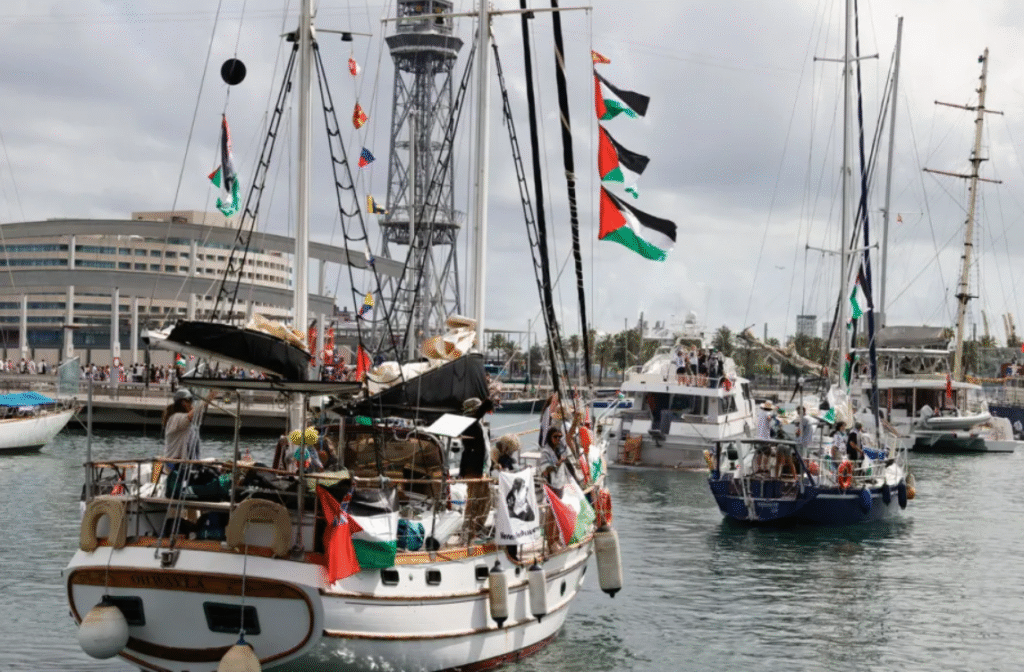
Fire on Gaza flotilla caught on camera
Visuals released by the movement show the exact moment the “Family Boat” was allegedly hit by a drone, causing a part of the ship to catch on fire.
Several videos on X and Instagram released by the organisation and the members aboard the flotilla also released videos of the alleged drone strike.
The Family Boat is one of the ships part of the campaign and was carrying the steering committee members at the time of the strike. As per the official statement, no member was harmed.
Before the Sumud flotilla, the Madleen, which was carrying Greta Thunberg was intercepted by Israeli military about 185 km from the Gaza coast. All those on board were detained and then deported back to their countries by Israel.
For the Sumud flotilla, the Israeli government and military has stated that it is prepared to take action.
The flotilla, carrying Greta Thunberg and activists from 44 other countries, set sail from Barcelona in August. The second wave of the ships were set to meet in Tunisia before resuming their course towards the Gaza Strip.
This incident not only underscores the perilous nature of humanitarian activism in conflict zones but also the geopolitical sensitivities involved. As investigations continue and international scrutiny intensifies, the world watches closely how efforts to deliver aid to the war-torn Gaza Strip adapt amid competing interests, regional tensions, and pressing humanitarian needs.
Tunisia Denies Claims
Tunisia has denied reports of the drone strike, with a spokesperson for Tunisia’s national guard telling AFP that “no drone” had been detected and that an investigation was ongoing.
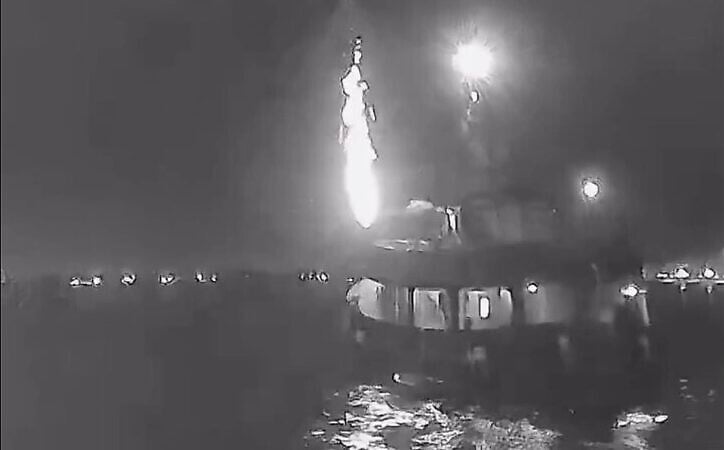
‘Largest Solidarity Mission’
Greta, 22, is among several activists participating in what organisers have called the “largest solidarity mission” to Gaza in history. On August 31, 20 boats departed from Barcelona, Spain, with the aim of breaking Israel’s blockade of the Gaza enclave.
Ahead of her journey, Thunberg said the flotilla was “part of a global uprising of people standing up” to “atrocities” in Gaza.
Israel had warned that the flotilla would be intercepted, with the boats captured and turned into Israeli Police boats, and activists detained.
The Global Sumud Flotilla said the incident was still under investigation and declined to provide further details.
Also read :
Anas al-Sharif Among 5 Al Jazeera Journalists Killed in Gaza Strike – Leaves Powerful Final Words
Greta Thunberg Detained as Israeli Forces Seize Gaza-Bound Aid Ship

